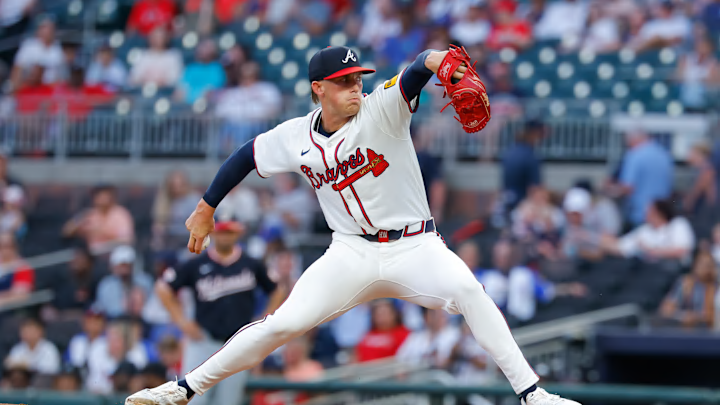Hurston Waldrep is a notable bright spot from the 2025 Atlanta Braves in an otherwise disappointing season. Starting with his appearance on Sunday, Aug. 3 (in which reliever Austin Cox recorded Atlanta’s first out on Aug. 2), the right-handed Waldrep recorded a 6-1 record, posted a 2.88 ERA, and logged 1.4 bWAR.
Even though Waldrep’s meteoric rise has fans dreaming about his candidacy for one of the Braves’ 2026 rotation slots, the Braves would be better served trading him away for four reasons:
1: His Value is at an All-Time High
According to FanGraphs, Waldrep will make the minimum league salary in 2026. He will have one minor league option remaining. He isn’t arbitration-eligible until 2029, and won’t be a free agent until 2032. After the two-month stint he just enjoyed, it is reasonable for teams to project him as a long-term, reliable starter with an abundance of team control (as well as flexibility for a team's 26-man roster).
His potential value to other franchises has never been higher, nor has the potential return the Braves could garner in trading him. Additionally, Waldrep's underlying metrics suggest that his greatest value to the Braves organization might be as a high-value trade piece, rather than as a member of Atlanta's starting rotation.
2: He is Likely to Regress
There is a reason that Waldrep wasn't "Plan A" for the Speedway Classic at Bristol Motor Speedway. In 19 starts with the Gwinnett Stripers in 2025, he posted a 7-8 record and a 4.42 ERA. The advanced metrics illustrated that Waldrep’s AAA statistics were well-warranted. Both his FIP and xFIP were 4.39 – nearly identical to his ERA.
According to FanGraphs, Waldrep’s expected ERA during his time with the Braves was 3.80 – almost an entire run higher than his posted 2.88 ERA. His 2025 FIP (3.21) and xFIP (3.66) tell the same story: Waldrep benefitted from his fair share of luck during his 2025 tenure with the Braves.
That he can continue to pitch at the dominant level he exhibited in 2025 is far from a guarantee. Some degree of regression seems far more likely.
3: The Braves need “Proven” Starters more than “Potential” Starters
The Braves have a plethora of “potential” starters, but are woefully short of “proven,” durable arms in the starting rotation. Case and point: in 2025, Bryce Elder led the Braves in the number of games started (28), even while posting a 5.30 ERA, 4.66 xERA, and 4.55 FIP.
While he's not short on potential, Waldrep has already endured an elbow injury during his 2024 campaign. The 23-year-old does not have the long-term track record that the Braves need to complement the stable of young arms stashed throughout the organization - especially if he is due for a regression. Instead of counting on Waldrep, the Braves would be better off acquiring one or more proven, durable starting pitchers this offseason.
4: Trading Waldrep Helps the Braves Contend in 2026
Despite a disappointing 2025, the Braves have aspirations of making a deep playoff run in 2026. For the best chance to do so, MLB.com's Braves beat writer Mark Bowman suggests that Atlanta needs to acquire starting pitching depth, bullpen reinforcements, a starting-caliber shortstop, and a versatile outfielder/designated hitter.
In that same article, Bowman reported that the Braves consider young, developmental pitchers an area of organizational strength. In other words, if the Braves are to be active on the trade market this offseason, don't be surprised if such packages involve players like Waldrep. Why stash Waldrep in the minors when he could be traded as part of a package to acquire a more proven commodity at one of those positions? And why not make such a trade this offseason, when his trade value might never be higher?
Trading Hurston Waldrep might very well be in the club's best interest in order to contend in 2026.
